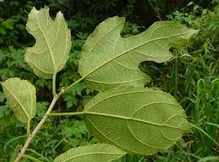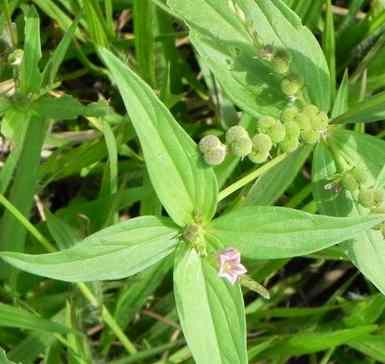
support@yorubalibrary.com
+2348073529208, 07038599574

In Yoruba traditional medicine, plants are more than natural elements—they are divine gifts used to sustain life and treat illness. One such powerful plant is Ewe Epin, known botanically as Ficus asperifolia. This plant belongs to the fig family and is commonly used across Yoruba land for its medicinal, reproductive, and spiritual properties.
Epin leaf is well known among traditional midwives (agbe’bi) and herbalists (oníṣègùn), who use it in treating female reproductive issues, male fertility, and spiritual cleansing. Its roots, leaves, bark, and milky sap are employed in both physical and metaphysical remedies. The plant is also associated with protection and is used in rituals and spiritual baths.
Key Facts
Category: Leaf
Botanical Name: Ficus asperifolia
Common Name: Sandpaper Leaf Fig/Rough Fig
Yoruba name: Ewe Epin
Igbo Name: Nil
Hausa Name: Nil
Characteristics of Epin Leaf
• Growth Habit: Shrubby or small tree, often with spreading branches.
• Leaves: Rough-textured, coarse, and sandpaper-like to touch; hence the English name “Sandpaper Leaf.”
• Fruits: Small, reddish or purplish figs, usually growing along the stem.
• Sap: White latex-like sap common to fig species.
• Habitat: Grows in forests, farmlands, riverbanks, and rural settlements across West Africa.
Traditional Uses in Yoruba Medicine
1. Infertility and Reproductive Health
One of the most common uses of Epin leaf is in fertility treatments. Decoctions from its roots and leaves are used to treat female infertility, regulate ovulation, and cleanse the womb.
2. Sexual Weakness and Low Libido
Men with erectile dysfunction or low sperm count are often given Ewe Epin-based mixtures, which are believed to stimulate sexual vitality and improve reproductive performance.
3. Menstrual Disorders and Uterine Conditions
Epin is used to ease painful menstruation, manage fibroids, and clear infections from the female reproductive tract.
4. Womb Cleansing After Miscarriage or Childbirth
Herbal baths and steams made with Epin leaves are administered to women post-miscarriage or delivery to cleanse the womb and restore hormonal balance.
Want to treat common ailments such as Malaria, Cough, Measles, Typhoid, Pile etc naturally without spending much? Grab a copy of Authentic Herbal Solutions: 15 Common Ailments & Their Natural Cures. A practical eBook recommended for everyone regardless of tribe, religion or association. Order below or Download sample here
AUTHENTIC HERBAL SOLUTION #4KOne Yoruba proverb says "Bí olóde ò kú, òde rè kì í wu Gbégi". Do you know that Gbégi is actually a leaf/plant? Get Yoruba Proverbs on Plants and Herbs, which is a collection of Untold Wisdoms Hidden in Leaf and plants comprising their Life Applications & Moral Teachings. Order below or download sample here
YORUBA PROVERBS ON PLANTS #4KHealing Properties of Epin Leaf
• Anti-microbial: Prevents and treats bacterial and fungal infections.
• Astringent: Contracts tissues and stops internal bleeding.
• Fertility Enhancer: Promotes ovulation, strengthens sperm quality, and improves reproductive health.
• Anti-inflammatory: Reduces internal and external inflammation.
• Uterine Tonic: Tones and strengthens the uterus, especially after childbirth or miscarriage.
• Spiritual Cleanser: Clears negative spiritual energy and protects against spiritual attacks.
Functions in Yoruba Traditional Medicine
• Used in herbal mixtures for women who experience recurrent miscarriages.
• Incorporated into spiritual protection for pregnant women to shield the unborn child.
• Ground into pastes or powders for topical treatment of skin conditions like ringworm.
• Combined with other herbs in male fertility tonics.
• Utilized in spiritual items for protection against ẹ̀mí burúkú (evil spirits).
Conclusion
Epin (Ficus asperifolia) stands out in Yoruba herbal medicine for its unmatched role in treating reproductive health challenges and offering spiritual defense. Its rough leaves may seem humble in appearance, but they carry the healing properties and different powers.
Have you heard of our Yoruba Herb Dictionary? This contains names of Yoruba Leaf, Roots, Barks, Characteristics, Properties & Identification with HD Pictures. Order below or download sample here
A-Z HERBS & LEAF DICTIONARY #4K
Know more about the Yoruba traditional uses and he…

Learn about Ewe Aran, a potent Yoruba medicinal le…